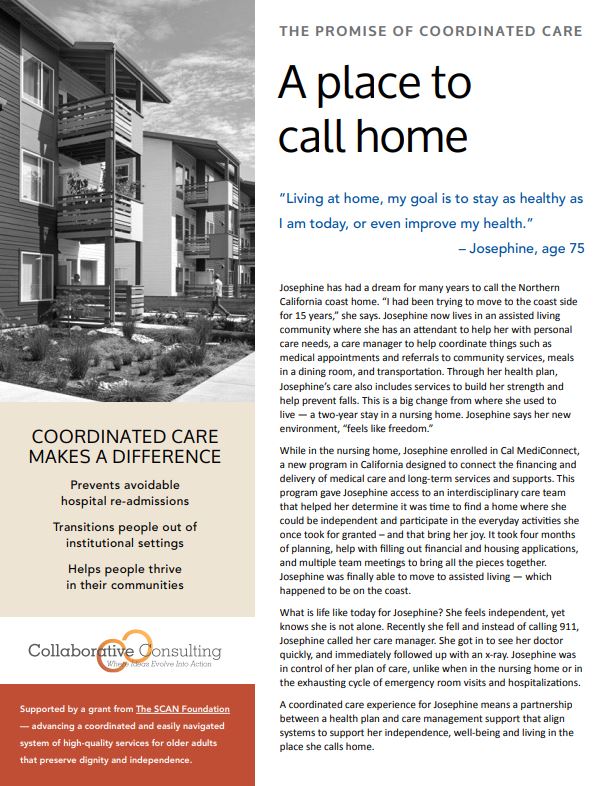The Promise of Coordinated Care: Josephine’s Story
summary
Coordinated Care Makes a Difference. It prevents avoidable hospital re-admissions, transitions people out of institutional settings and helps people thrive in their communities. Read Josephine’s case study.
Date Updated: 01/14/2016The Promise of Coordinated Care
A place to call home
Josephine has had a dream for many years to call the Northern California coast home. “I had been trying to move to the coast side for 15 years,” she says. Josephine now lives in an assisted living community where she has an attendant to help her with personal care needs, a care manager to help coordinate things such as medical appointments and referrals to community services, meals
in a dining room, and transportation. Through her health plan, Josephine’s care also includes services to build her strength and help prevent falls. This is a big change from where she used to
live — a two-year stay in a nursing home. Josephine says her new environment, “feels like freedom.”
“Living at home, my goal is to stay as healthy as I am today, or even improve my health.” – Josephine, age 75
While in the nursing home, Josephine enrolled in Cal MediConnect, a new program in California designed to connect the financing and delivery of medical care and long-term services and supports. This program gave Josephine access to an interdisciplinary care team that helped her determine it was time to find a home where she could be independent and participate in the everyday activities she once took for granted – and that bring her joy. It took four months of planning, help with filling out financial and housing applications, and multiple team meetings to bring all the pieces together. Josephine was finally able to move to assisted living — which happened to be on the coast.
What is life like today for Josephine? She feels independent, yet knows she is not alone. Recently she fell and instead of calling 911, Josephine called her care manager. She got in to see her doctor
quickly, and immediately followed up with an x-ray. Josephine was in control of her plan of care, unlike when in the nursing home or in the exhausting cycle of emergency room visits and hospitalizations.
A coordinated care experience for Josephine means a partnership between a health plan and care management support that align systems to support her independence, well-being and living in the
place she calls home.
Download the publication for all visuals and complete references.
Continue Reading
This policy brief provides an introduction to The SCAN Foundation’s CLASS Technical Assistance Brief Series, which explores many of the critical issues to be considered for successfully implementing CLASS.
This policy brief describes the broad needs of individuals with disability and the wide range of supportive and environmental solutions that can allow for the most independent living possible. It suggests how findings on social and environmental supports for individuals with disability can inform implementation of CLASS.
This policy brief provides background on the historical development of benefit eligibility triggers in the private long-term care insurance market. Understanding how these triggers came into being can provide important information to those charged with implementing the CLASS Plan.


